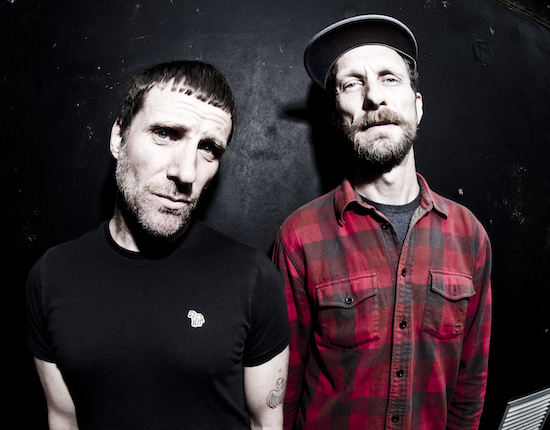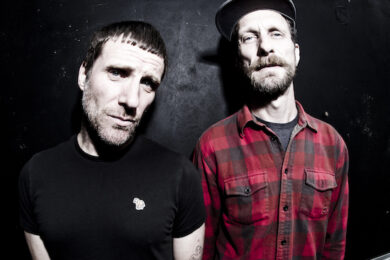Jason Williamson helps himself to another coffee from a machine in the green room upstairs at the John Dee, a gig venue in Oslo, with a sideways glance at a fridge of beer. Coloured light from a rotating lampshade lands on objects like the arrow on a gameshow wheel: blue cheese, half-empty bottle of red wine, stuffed bulldog wearing a yellow cap. "17 more shows to go," tour manager Steve Underwood announces, shuffling a stack of papers. "Is that all?" Jason replies, smirking.
Sleaford Mods have changed in the last year. Jason’s got new ink commemorating their support slot at Wembley with The Stone Roses: 17.6.17. The stuffed bulldog, a present from Jason’s kids, has joined the band on the road. His tour manager ribs him for taking selfies with it in public. Then there’s the booze, that Jason knocked on the head last year after he discovered that a full time touring schedule and a drink habit don’t mix.
By 10.30pm the band are rolling down the hill to bed, ready for Stockholm the following day. It’s hardly Spinal Tap. But for Jason, getting sober and playing a decent show every night are more important. "The idea is to stay in the game," he recently told The List, "to survive."
It’s been said before that no other band totally encapsulates the current British predicament: the hopelessness of working people facing stagnating wages, inflation, a collapsing welfare state.
But Sleaford Mods are also a product of the present catastrophe. As their name suggests, we are all, in our own way, smalltown mods, trying to buy ourselves a better future even as that future is snatched from us by Brexit, generational inequality and the unforgiving squeeze of a right-wing Government.
Once being a mod meant living above your station and dreaming of something better than where you came from. The late cultural critic Mark Fisher wrote that the mods of the 60s existed in a dream world of glamour and gangsterism, even if their reality was a parka and a packet of chips. He added: "With Sleaford Mods the chips are all that’s left."
Sleaford Mods show us England after the classless dream of the mods has died. The 2014 video for ‘Tied Up In Nottz’, released before Brexit, captured the wretchedness of small town England. It opens with a shot of Jason’s soggy brown brogues in a puddle. Here’s a man of style, a man who wanted something more once, digging in his purse for small change at the corner shop and standing in line for a bus in the rain.
On the back of the bus, as they travel round the city where they live, Sleaford Mods tell us about a fragmented night out in this place. Jason sings of stinking toilets, casual sexism, the "two pints destroyer" who can’t handle his drink, the "lonely-little DJs with no life", the inevitable call to a coke dealer when everyone is drunk. "We are real," Jason says, putting himself in the fray. "We are looking 20p in the 10p mix."
The video is set in Nottingham, where Jason lives. This city voted marginally in favour of leaving the EU. In the three months after the referendum, it had the second biggest rise in hate crime of anywhere in the UK: up 75 per cent. In one of nearly 200 similar incidents, racists broke into a home in Nottingham and told a Latvian family they were "fucking immigrants" and must leave the UK.
Sleaford is 30 miles from Nottingham and surrounded by fenlands. It has attracted successive waves of immigrants who often work low paid jobs on the land.
Jason didn’t know Brexit would happen when he chose the name. He wanted Sleaford Mods to be a nod to where he comes from, in opposition to the ruling classes and the metropolitan elite. You can hear this in his delivery: a flat, Midlands accent.
But by namechecking Sleaford as a rejection of the middle class elite in London, Jason put a flag in the part of the country that would one day have the highest number of leave voters in the UK.
He chose to call himself a mod as another small rebellion: "I thought Mod had been hijacked by the laziness of mainly Paul Weller and Noel Gallagher, who were in 2006 and 2007 still viewed as the oracles of the current movement," he says. "They’d become useless, fat, overblown. It was, in my own little world, a takeover so to speak, a coup."
Mods were a breed of teenagers that emerged at the end of the fifties wearing boxy, tailored suits, listening to American jazz and soul records and espousing European culture. In The Soul Stylists by Paolo Hewitt, Patrick Uden, a former mod, says: "Modernism was a uniquely English idea because it was born from the frustration of having nothing. To be a Modernist you had to come from a culture where Modernism didn’t exist and that made you different."
Uden goes on: "England at that time, Britain was ancient, it was falling apart. It was awful. You have no idea, even by 1965, how miserable and grey Britain was. What was modernism about? It was an acquisitiveness for the things not available in the UK."
Magpie-like, the original Mods appropriated fine things from other cultures. They espoused films like Roman Holiday or West Side Story that showed Italian scooters and sharp suits, attentiveness to interior design, nice coffee, French literature and suit tailoring. Though the mods didn’t have any musical policy to begin with, one developed around imported American soul records.
While this was a reaction to the greyness of post-war Britain, it also existed within the establishment. Mods wore suits: they looked like businessmen. Uden says: "They were the first kids to have real jobs and they were very proud of it, you know."
In Mods: The New Religion by Paul Anderson, a lady called Pat Farrell from London describes how she was 13 in 1960 when suddenly everything changed. "Something happened to my generation, our minds suddenly changed and we said, ‘This is our world and we’re going to do something.’"
Sometimes this verged on the ridiculous. In his book Mod, Nik Cohn wrote about one Thomas Baines, who refused to have sex at parties without a shoe tree and a trouser press.
There was only one problem. Mods were poor: they came from working class backgrounds. They often didn’t have the money for the things they desired. So being a Mod involved a kind of capitalist optimism.
Dave Isley remembers saving all week to afford the petrol for his scooter. "We were nearly all apprentices on crap wages. When I had a day release from college all I had all day was a steak and kidney pie because I had to save money for petrol." They bought lab coats and dyed them black because they couldn’t afford real suede coats.
Another young mod who lived on a council estate describes how competition to get the nicest things became fierce. On Saturday mornings a dozen of her friends would leave the estate and go to Austin Reed and try on suits while the terrified the assistants who would hide out the back. If the clothes fit, the teenagers would walk out with them.
In this way classless, consumerist Britain is traceable to the mods. Most of them were working class but they refused to live at their station. They were elitists, forward facing: they wanted nice things.
By the time Jason hit his teenage years in 1983, working class youth subcultures had fractured. Jason flirted with becoming a scooter boy after listening to psychobilly bands like the Meteors. He says: "I tried to dress up for it, I was a bit of a scooter boy. Pilot jacket, American lightweight camouflage trousers, crows nest haircut that didn’t look very good, that kind of thing."
But the scene was changing. Jason remembers a few mods in the 80s but mostly this new breed of second generation mods who turned out to be scooter boys and skinheads: "It wasn’t very nice."
Skinheads emerged from mod-culture, embracing working class fashion. They wore Levis, cropped hair and durable shoes and boots, against the fancy dress escapism of those before them. The movement became associated with racism during the economic decline and rising unemployment of the 70s, when neo-Nazi groups used nationalist ideas to turn skinheads, who were sometimes out of work or on the dole, against their immigrant neighbours.
Jason remembers scooter rallies as hostile environments. He went to one in Donnington in the mid-80s when Desmond Dekker played and there were skinheads trying to get onstage and batter him with pieces of wood. By this time Margaret Thatcher was in power and the welfare state that had been put in place in postwar Britain was being dismantled.
The mods who were in their teens in the 60s now stood to benefit from policies like right to buy, which sold council or publicly-owned homes to people who lived in them for knock-down prices, shrinking social housing stock. Thatcher’s philosophy rested on individualism rather than collective society. It was a philosophy that signalled a pulling up of the drawbridge that had allowed working class people to dream beyond their station.
Despite all these changes, the mods’ aspirations of elitism endure today. The fashion of the 60s is ubiquitous. It’s normal to go to fancy coffee shops, take drugs at the weekend, get fitted suits. We are all now career-minded hedonists.
At the same time, these aspirations make mod culture a nostalgic proposition. In the 90s, Britpop reimagined the grey, desperate middle of the century as a golden era of rainy seaside holidays, Union Jacks and amusement parks.
Phil Daniels’s verses in Blur’s ‘Parklife’ in 1994 draw a line from the mod culture of Quadrophenia through to Britpop. The mod target made a comeback, Paul Weller had a career resurgence, and Noel Gallagher waved his black Amex at TV presenters to prove his wealth.
Now, Jason thanks his stars he didn’t make it in Britpop bands in the 90s. "It’s a good job I didn’t get anywhere at that time. I would have been chewed up and spat out. I would’ve have been fucking gone, what’s the point," he said.
By the time Jason worked out how to yell over samples, the conditions that led to Brexit were taking root. The financial crash in 2008 preceded the longest period of wage stagnation in history. The idea that you will one day be able to buy a house, get a pay-rise or a promotion, even just afford to live, is no longer something to take for granted as it was for teenagers in the sixties. The class dream that inspired the mods collapsed.
So we’re left with the Sleaford Mods, the snappy dressers from small towns raging against failure of the system. Until an alternative emerges, we are all bound to neo-liberal capitalism as it increasingly reveals itself to be an inadequate response to the economic challenges of the modern age.
At their shows you feel this rage: in Oslo, like at Wembley, the floor is filled with men pumping their fists and yelling. Sober, surviving, Sleaford Mods keep winning fans who feel angry and cheated by capitalism and find solace in the shared experience even if it offers no solution.
Jason says: "I love how [the name Sleaford Mods] still confuses the die hard scooter idiots. But I suppose I am one of those idiots too. Perhaps I’m still bound to its blueprint."
This piece was originally presented at the EMP Pop Conference 2017, under the title ‘Sleaford Mods, Brexit and the death of a 60s dream’



